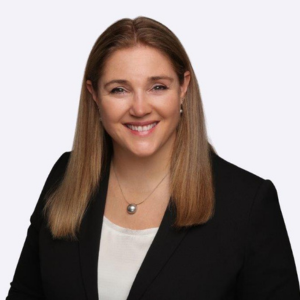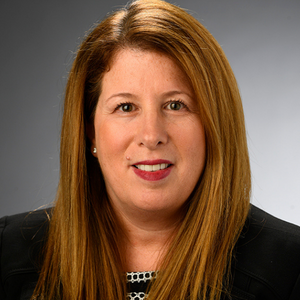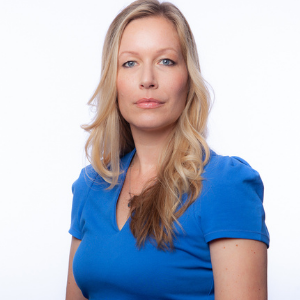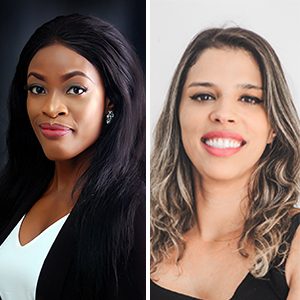Lindsay Rosner, CFA: Principal at PGIM Fixed Income
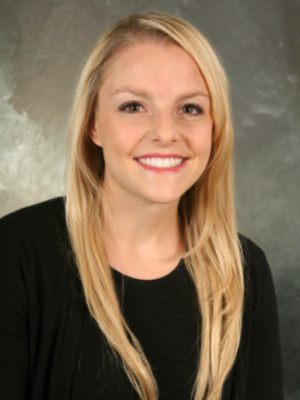 “What’s guided me throughout my career is looking for people who are both happy and genuinely interested in what they’re doing,” says Lindsay Rosner about her career journey. “I want to see that personal happiness factor.”
“What’s guided me throughout my career is looking for people who are both happy and genuinely interested in what they’re doing,” says Lindsay Rosner about her career journey. “I want to see that personal happiness factor.”
As a fixed income investor, Rosner can talk about the credit markets all day long, but when it comes to professional development she speaks to investing in yourself. For her that means taking your seat at the table and not being afraid to bring your whole self to work.
During the pandemic, she’s seen more kids, dogs, and spouses than she ever imagined could enter the workplace, but those interactions have helped bring a real human element to business, and for Rosner that’s a step in the right direction.
Insisting on Personal Happiness Factor
While every job has its grunt work – she remembers taking breakfast orders as a Wall Street intern – Rosner looks for work that enlivens her and the people around her.
“I started on Wall Street right out of college. There were some unhappy people,” she recalls. “Fortunately, I worked with quite a few clients who were happy. So, I tried to find myself a job that would prove both professionally challenging and personally satisfying.”
Rosner loves constantly learning, addressing problems, finding solutions and being part of developing and implementing new products.
Recently, she’s animated by exchange traded funds (ETFs) in the fixed income space, allowing access to diversified investments with lower dollar amounts, as well as Environmental Social Governance (ESG) factors and increasingly ESG funds. While governance has always been fundamental to the bottom-up credit analysis conducted by Rosner and her PGIM Fixed Income colleagues, she enjoys being part of the broader ESG conversation which increasingly has shifted to include not only an emphasis on governance, but also social and environmental criteria.
ESG factors are more and more part of the conversations Rosner has with her institutional and retail clients, but also part of the conversations credit analysts are having with Chief Financial Officers and Treasurers because those factors can and do impact the cost of financing.
Investing in Your Value Equation
Early in her career, Rosner was positioned in the equities division of Lehman Brothers as the firm was going under. She found herself in a precarious position that she has not since forgotten and that has informed her decisions.
“Two years out of college on the trading floor means that you are only beginning to understand the markets and risks of positions. You’re deftly quick in putting together the morning meeting packets, have mastered ordering lunch for 40 people and frequently assist senior traders; However, you aren’t in the driver seat yet.” she states. “When Lehman was facing bankruptcy, I saw all the more senior people who I’d been assisting every day interviewing to get their lives figured out, and I quickly learned I needed more marketable skills and a wider network.”
As Barclays purchased Lehman Brothers, Rosner was never out of a job, but realizing she was on her own was a harrowing experience that taught her a valuable lesson: “I will never put myself in a position again where I don’t have the skills. If something happens totally out of your control, you have to be ready.”
Despite many views on the trading floor that a CFA designation was not necessary for a trading role, Rosner attained her CFA as a personal insurance policy and to fortify her credentials. Rosner has since chosen to keep her knowledge and skillset wide, rather than niche.
“Even within your organization, you have to think about the opportunities for specific roles or jobs through the lens of what is best for you,” she says. “For me, I’ve always chosen to pursue roles that are broader.”
Claiming Your Seat at The Table
Rosner emphasizes that you have to actively claim your seat at the table and occupy it with your whole self.
“If you want to be involved in the conversation, you don’t sit in the seat in the back of the conference room,” she asserts. “If there are not more seats, you should pull your chair up to the table and get involved to the appropriate degree.”
Rosner admits she has leaned towards over-preparation in claiming that seat.
“Diversity is not where I’d like it to be in the industry. That’s not only from the gender standpoint. It’s racial diversity as well. I care tremendously to see that change,” says Rosner. “With fewer senior women, I always over-prepare. If that comes across as confidence, I’ve made it look easy. But the fact is, I have a lot to prove.”
But she has also learned to embody her own skin fully.
“You get to a point in your life where you realize you have to be yourself. The path forward isn’t going to happen unless you are,” states Rosner. “That means bringing all of you to the table, not being ashamed to talk about having children, etc. There are times where I will question if the analogy I use, or story I tell, will resonate with the room, but you have to be yourself to be successful.”
Bringing Your Whole Self
“I speak loud. I use my hands. I’m pretty emotive. I have a lot of facial expressions. I bring a little bit of my personal life into my work life, whereas some draw a hard-line,” says Rosner. “I just think, this is the whole me. You need all of it.”
When starting out, she remembers taking training classes for client lunches. “There’s so much importance placed on professionalism, and some of it is so contrived,” she observes. “At the end of the day, these are people too who you’re working with.”
Rosner has long invited back her sense of self-deprecating humor to the office, as part of what helps build connection and relationships, and part of her own professionalism.
“You don’t connect with people when it’s all buttoned up. I love being a storyteller, telling a story and making people laugh,” she says. “We all have those relatable, funny moments and experiences and people will remember those interactions.”
“You’re not always going to connect by talking about a company’s balance sheet. Instead, be vulnerable. Being yourself allows others to be themselves,” she notes. “People value that you remember their kid was going to an important doctor’s appointment and ask what occurred. That’s being real.”
Building Your Village
“I think everybody needs a village. So much is building that village of men and/or women who support you, professionally or personally,” notes Rosner. “It’s all give and take. You have to help somebody in order to get it back.”
While she’s found you can learn from any partnership, Rosner has often benefited the most from the informal mentorships where “often you don’t realize it’s a mentorship until later,” even when the benefit might be tough love.
“Everyone can offer something. There are different times in your career where you’ll need different people so it’s important to keep those contacts,” she notes. “You may not need them for three years, but in a moment you realize that person is the perfect person to give advice on this issue, and you reach out to them.”
On the flip-side, Rosner notes that seeing people who she mentored do well is as rewarding and fulfilling as if it were her own success.
Working From Home
With a three year old and a twenty month old at home, Rosner has enjoyed and needed the flexibility of the remote workplace, whereas the previous expectation was full team presence on the trading floor. The pandemic has put into consideration whether that’s as critical as once believed.
Rosner notes that the remote workspace has brought more recognition and valuing of a perspective that women have always been able to offer.
“Women really have a pulse on what’s going on in the family and the balance sheet of basic consumers in the country,” says Rosner. “You can bring that kind of knowledge to bear, and it’s actually valuable in my work setting now.”
She’s also found the remote workplace means she can be available more easily to chat with others when it comes to mentoring and networking, and even more so with those outside of her organization.
Rosner loves spending time outdoors with her little ones and is enjoying the arrival of spring.
By Aimee Hansen

